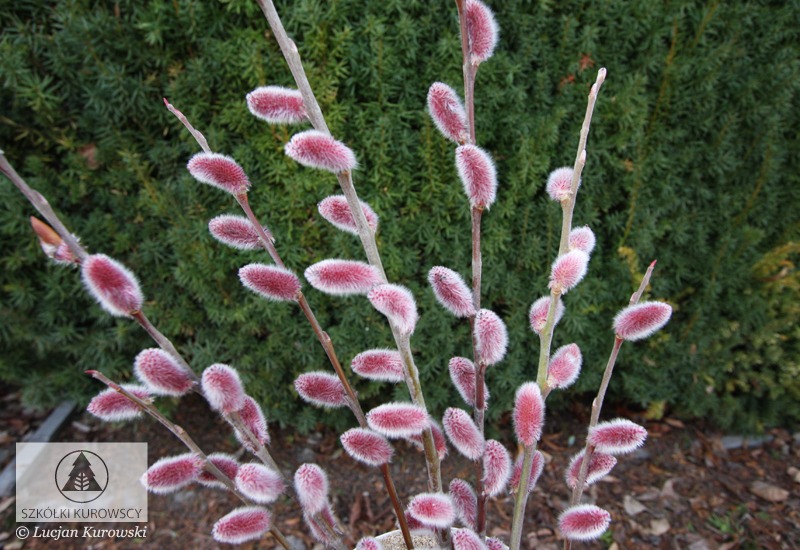
Salix gracilistyla 'Mt Aso' Wierzba smukłoszyjkowa 'Mt Aso'
Salix gracilistyla 'Mount Aso' (Japanese Pink Pussy Willow) is a bushy deciduous shrub boasting a profusion of fuzzy rosy-pink catkins, 1 in. long (2.5 cm). They gradually expand to 2 in. long (5 cm), as they mature, turning silvery gray before covering themselves in yellow pollen.

Salix gracilistyla 'Mount Aso', Pussy Willow 'Mount Aso' uploaded by
Salix gracilistyla 'Mount Aso' type Trees or Shrubs family Salicaceae ph 5.6 - 7.8 Acid - Neutral Light Full sun to partial shade Frost Full Frost Hardy: 5F (-15°C) Soil Moist and free draining Water Occasional watering Plant & bloom calendar Best time to plant When the plant will bloom full grown dimensions 1.50 M 1.50 M Description

Mt. Aso Pink Japanese Pussy Willow (Salix gracilistyla 'Mt. Aso') in
Salix gracilistyla 'Mt. Asama' SKU: S67108 1 for $39.00 (0 Reviews) Quick Facts Buy more, save more Delivery Date Ships at the right time for spring planting Add to cart Add to Wishlist Add to cart Shipping Details Shipment begins in early March 2024, depending on your zone. See shipping tab for details

Plant of the week Salix chaenomeloides 'Mt Aso' Thomas Stone MCI
Synonym Sun Exposure Full Sun Foliage Deciduous Provides Winter Interest Height 4-6 ft. (1.2-1.8 m) Spacing 6-8 ft. (1.8-2.4 m) Hardiness USDA Zone 4b: to -31.6 °C (-25 °F) USDA Zone 5a: to -28.8 °C (-20 °F) USDA Zone 5b: to -26.1 °C (-15 °F) USDA Zone 6a: to -23.3 °C (-10 °F) USDA Zone 6b: to -20.5 °C (-5 °F) USDA Zone 7a: to -17.7 °C (0 °F)

Salix chaenomeloides 'Mt Aso', saule japonais
'Mount Aso' is a multi-stemmed, deciduous, male shrub with upright, wide-spreading stems, silky-hairy when young, and oblong, blue to grey-green leaves, white-felted beneath. Red, silky catkins in late winter or early spring turn grey then yellow with age. Season of interest Height and spread Metric | Imperial Where to grow Soil type Clay Loamy

Salix chaenomeloides... stock photo by Robert Mabic, Image 0563100
Mt. Aso Pink Pussywillow (Salix gracilistyla 'Mt. Aso'): Members of the genus Salix are commonly known as willows. These woody plants range in size from the imposing weeping willow tree to small shrubs. While not fussy about soil quality, they generally require moderate to wet soil moisture. In the wild, willows are commonly found near streams, rivers and ponds.

salix chaenomeloides catkins intermedia ‘Pallida’ & Salix
Salix gracilistyla 'Mount Aso' Japanese pink pussy willow 1 star 1 star 1 star 1 star 1 star ( 3) The stems of the wonderful 'Mount Aso' are clothed with fuzzy pink catkins in late winter and early spring, which are impossible. 2 litre pot £13.99 £ 27.99 In stock (shipped within 2-3 working days) 12 litre pot | 80 - 100cm tall £89.99

Wilg Salix gracilistyla 'Mount Aso'
'Mount Aso' Japanese Pink Pussy Willow is a deciduous flowering shrub that is sure to be a conversation piece in your landscape, and in your home. You can't grow it indoors, but budded branches can be cut in spring to create a magnificent floral display in your favorite vase.

Salix gracilistyla 'Mt. Aso' (Wilg, Katjeswilg) De Tuinen van Appeltern
Salix gracilistyla 'Mount Aso' Japanese Pink Pussy Willow Hardy FROM £12.99 100% (8 Reviews) Garden Club Members Price: FROM £11.69 JOIN TODAY Irresistable fluffy pink catkins Handsome blue-green foliage with silvery undersides Perfect for cut flower arrangements and winter borders Delivery Information View Product Description
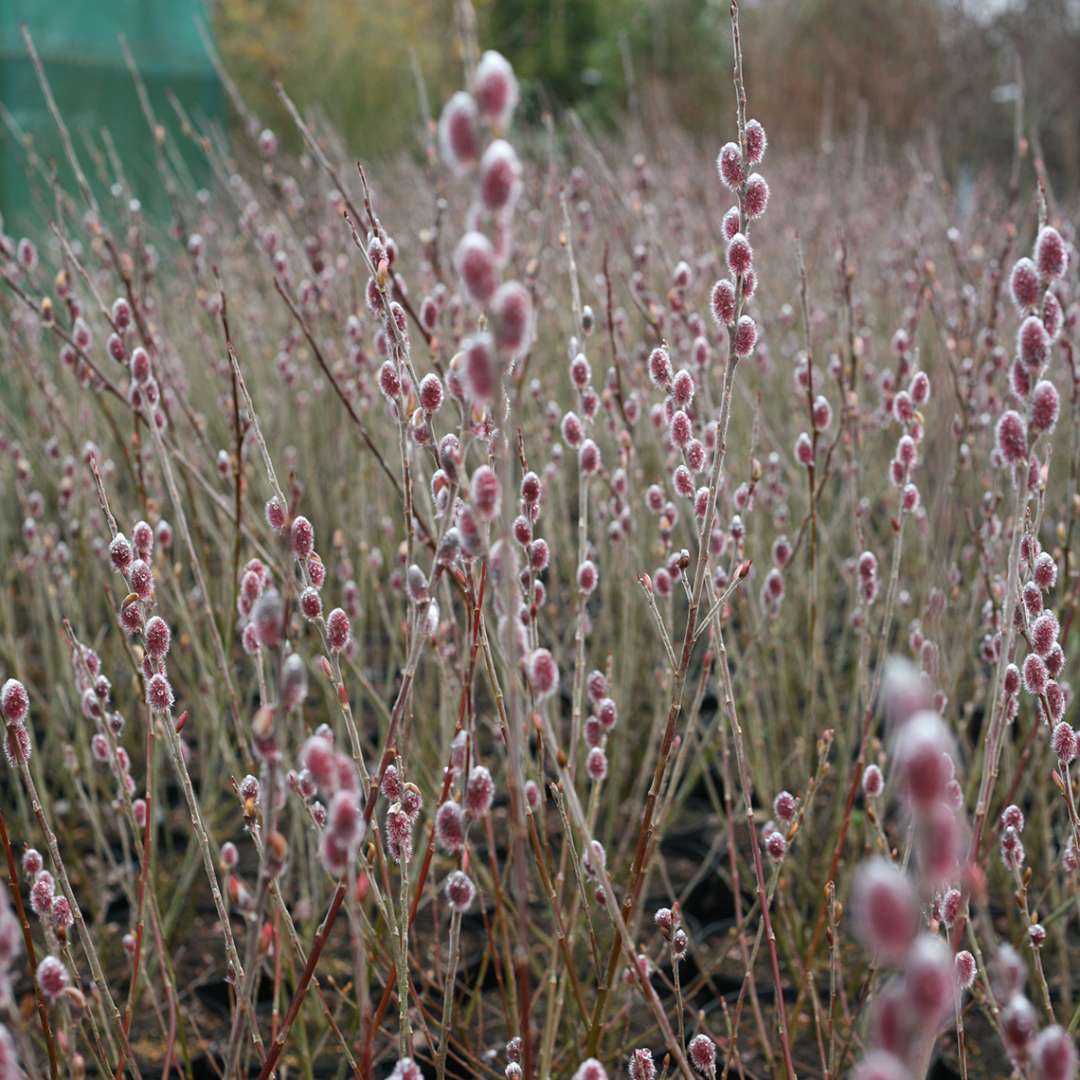
Mt. Asama Salix Spring Meadow wholesale liners Spring Meadow Nursery
Shrubs Salix gracilistyla 'Mount Aso' (m) willow 'Mount Aso' A bushy shrub reaching about 3m, with slightly bluish leaves, silvery on the underside. The catkins, produced in spring before the leaves, are pink with a silvery sheen Synonyms Salix chaenomeloides 'Mount Aso' Join the RHS today and save 25% Join now < > © RHS / Joanna Kossak
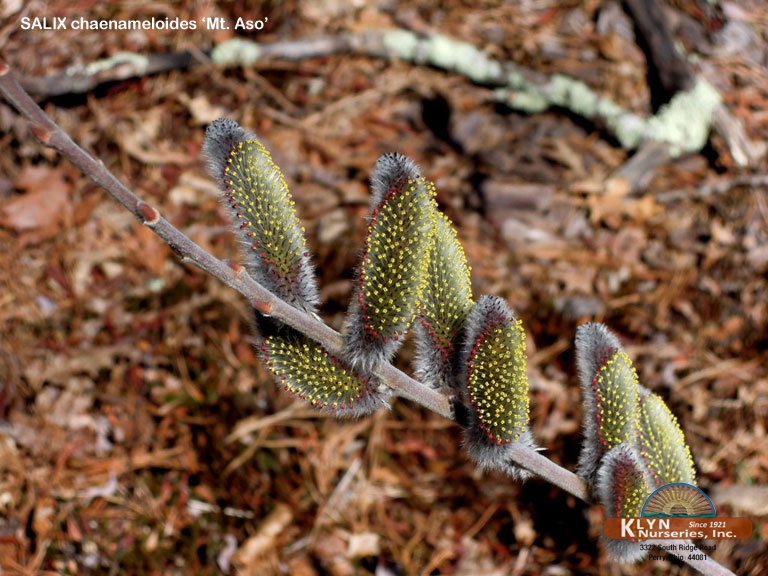
SALIX gracilistyla 'Mt. Aso' Mt. Aso Japanese Pussy Willow
Willow - Japanese Pussy. 'Mt. Aso' Japanese Pussy Willow has beautiful bright pink male catkins appearing in March and April. The fuzzy flowers slowly elongate as they open, ending up almost 2" long by the time the pollen is exposed. Pussy Willows make great cut branches for forcing in January and February, and 'Mt Aso' is a particularly showy.

Salix gracilistyla 'Mt. Aso' in summer, when coppiced. Herbs, Salix
While there are many different species and varieties of willow, which all bear catkins, the one most widely grown in gardens and best known as 'pussy willow' is Salix caprea 'Kilmarnock', or 'Kilmarnock willow'. This is a small and compact deciduous tree, ideal for small gardens.
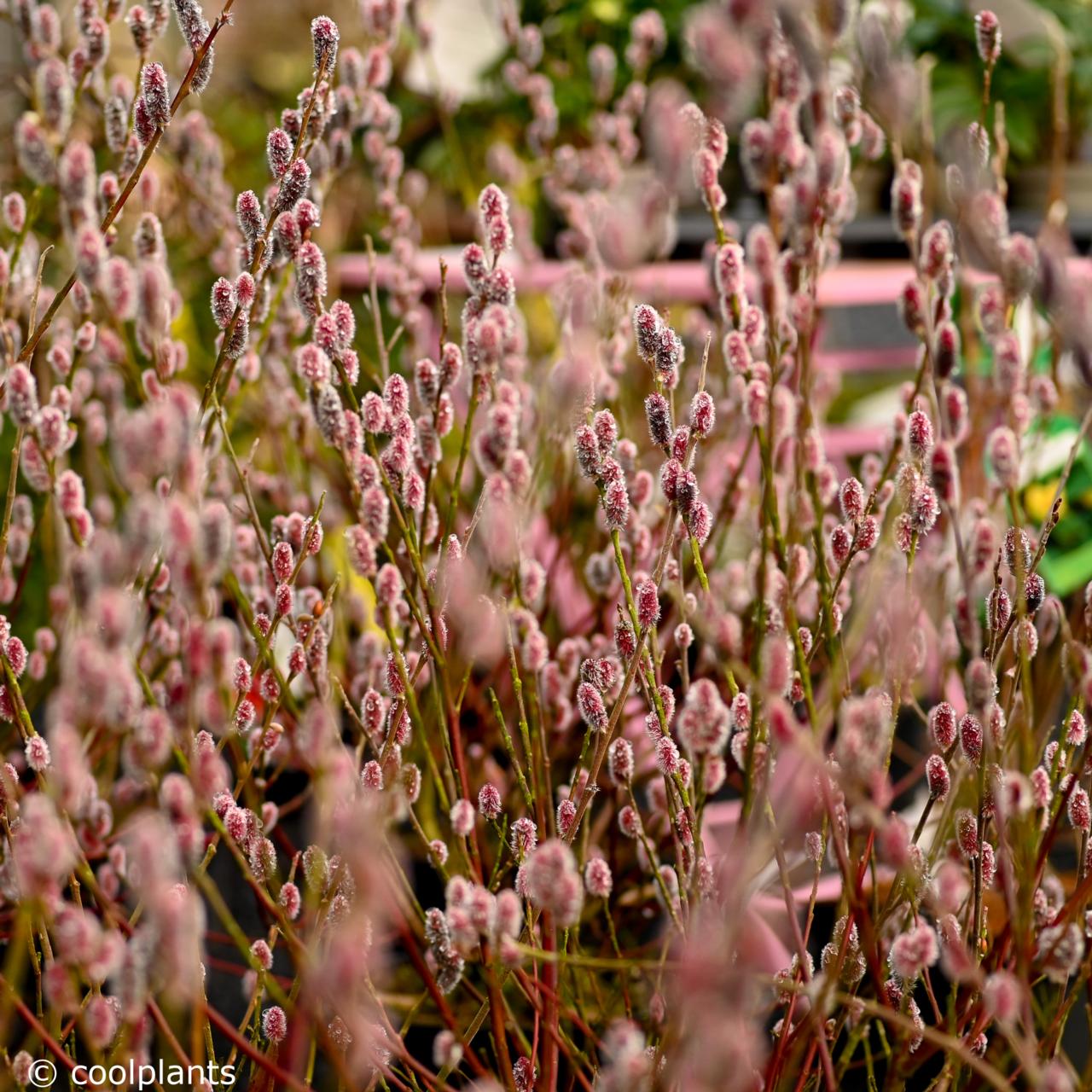
Salix gracilistyla 'Mount Aso' acheter des plantes sur Coolplants
Details Magic to behold in spring when the glowing, rich-pink, felted catkins emerge from winter's rest. The vigorous, 10-15' male shrubs provide ample display in the garden and are equally impressive when used for cut branches. Attractive, blue-cast foliage adds color and presence to the landscape during the remainder of the growing season.

Salix gracilistyla 'Mount Aso' The Beth Chatto Gardens
Plant size: Well rooted plant, about 18-24" tall with a well developed root system. Salix gracilistyla, 'Mt Aso' Variety description: This later winter to early spring blooming willow was selected in Japan for the cut flower trade. Large pink catkins hold up well as cut stems. If left on the plant, they turn black and gold after about two.

Salix gracilistyla Mount Aso® Future Forests
Learn how to design and implement a systematic method for conducting research in this comprehensive guide. Download the PDF from ICDST and discover the steps, tools, and techniques for effective research.
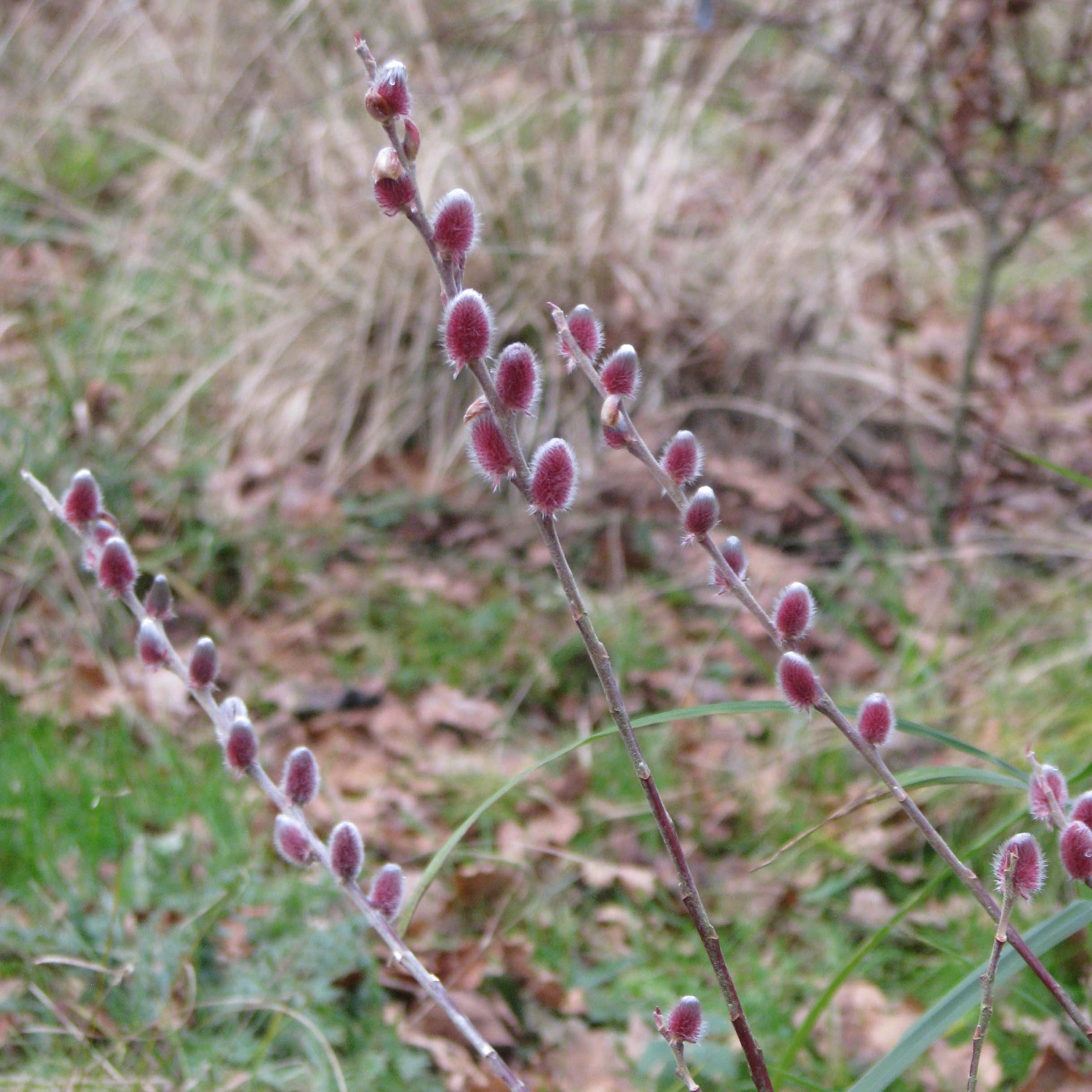
Salix chaenomeloides Mount Aso Saule japonais à chatons rose rouge
Tucked amongst the plantings in the southern border of the Winter Garden, Salix gracilistyla 'Mount Aso' adds further winter interest. S.gracilistyla, or pussy willow, is one of approximately 300 species associated with damp habitats, which occur everywhere around the world except Australasia.It originates from eastern Asia, and has a spreading, arching habit and occasionally finely.